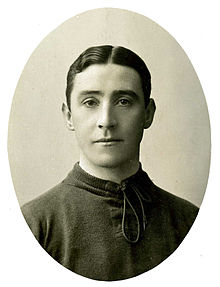Jimmy Hogan

Jimmy Hogan in 1908
|
|||
| Personal information | |||
|---|---|---|---|
| Full name | James Hogan | ||
| Date of birth | 16 October 1882 | ||
| Place of birth | Nelson, Lancashire, England | ||
| Date of death | 30 January 1974 (aged 91) | ||
| Place of death | Burnley, Lancashire, England | ||
| Playing position | Inside forward | ||
| Senior career* | |||
| Years | Team | Apps | (Gls) |
| 1902–1903 | Rochdale Town | ? | (?) |
| 1903–1905 | Burnley | 50 | (12) |
| 1905–1907 | Nelson | ? | (?) |
| 1907 | Fulham | 4 | (0) |
| 1908 | Swindon Town | 9 | (9) |
| 1908–1913 | Bolton Wanderers | 54 | (18) |
| Teams managed | |||
| 1910 | Netherlands | ||
| 1911–1912 | FK Austria Vienna | ||
| 1914–1921 | MTK | ||
| 1918–1920 | BSC Young Boys | ||
| 1924 | Switzerland | ||
| 1925 | Lausanne Sports | ||
| Dresdner SC | |||
| 1925–1927 | Hungária | ||
| 1931–1932 | FK Austria Vienna | ||
| 1932–1933 | RC Paris | ||
| 1933–1934 | Lausanne Sports | ||
| 1934–1935 | Fulham | ||
| 1936–1939 | Aston Villa | ||
| * Senior club appearances and goals counted for the domestic league only. |
|||
James "Jimmy" Hogan (16 October 1882 – 30 January 1974) was an English football player and coach of Irish descent. He is counted amongst the great pioneers of the game on the European continent.
Hogan enjoyed some success as a footballer, reaching an FA Cup Semi-final with Fulham in 1908, but it was as a coach that his abilities shone through.
Upon the outbreak of the First World War Hogan was working in Austria, and was interned as an enemy alien. During this time however he was involved in coaching Hungarian club MTK, actions which were negatively perceived by some in the UK.
Hogan was born in 1882 into an Irish Catholic family in Lancashire, the son of James Hogan, he grew up in Burnley and received his early education at St Mary Magdalene RC School at Gannow, his father hoped he would enter the Priesthood and sent him to study as a Boarder at the Salford Diocesan Junior Seminary St Bede's College, Manchester in September 1896. He graduated at Midsummer 1900 after deciding not to pursue his vocation any further, but was College Head Boy in the 1899/1900 Academic Year. After leaving school he became a football coach working across Europe and was teaching in Austria at the outbreak of World War One, when he was arrested and interned as an enemy alien. After the war he returned to England and moved to Liverpool to be with his family, whom he had not seen for four years, and gained employment at Walker's Tobacco in Everton.
Hogan is considered one of the great pioneers of the game on the continent, especially in Austria, Hungary, Switzerland and Germany. In Switzerland he coached ca. 1924 Young Boys Berne. In that period he was also besides his compatriot Teddy Duckworth, then coach of Servette FC, and the Hungarian Izidor "Dori" Kürschner, then coach of FC Nordstern Basel, responsible for one of three regional coaching groups preparing the Swiss national team for the Olympics 1924 in Paris. Duckworth would take the team there to the final, losing to the giants of that era, Uruguay, 0–3. This is up to now the greatest success in Swiss footballing history. In 1925 and from 1933 to 1934, Hogan coached Lausanne Sports.
...
Wikipedia
